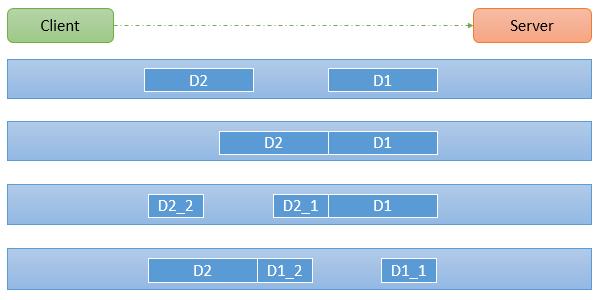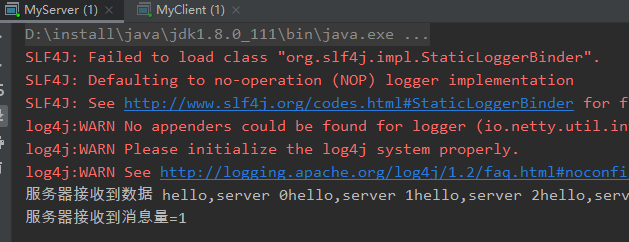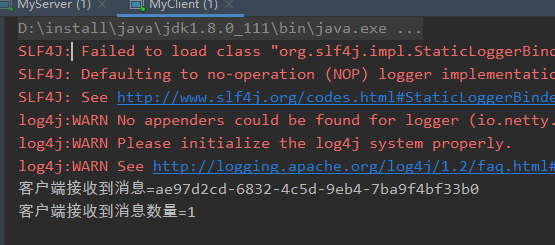一、基本介绍
1)、TCP 是面向连接的,面向流的,提供高可靠性服务。收发两端(客户端和服务器端)都要有一一成对的socket,因此,发送端为了将多个发给接收端的包,更有效的发给对方,使用了优化方法(Nagle算法),将多次间隔较小且数据量小的数据,合并成一个大的数据库,然后进行封包。这样做虽然提高了效率,但是接收端就难于分辨出完整的数据包了,因为面向流的通信是无消息保护边界的。
2)、由于TCP无消息保护边界,需要在接受端处理消息边界问题,也就是我们所说的粘包、拆包问题。
3)、TCP粘包、拆包图解
 假设客户端分别发送了两个数据包D1和D2给服务器端,由于服务器端一次读取到字节数是不确定的,故可能存在以下四种情况:
假设客户端分别发送了两个数据包D1和D2给服务器端,由于服务器端一次读取到字节数是不确定的,故可能存在以下四种情况:
1、 服务器端分两次读取到了两个独立的数据包,分别是D1和D2,没有粘包和拆包;
2、 服务器端一次接收到了两个数据包,D1和D2粘合在一起,称之为TCP粘包;
3、 服务器端分两次读取到了数据包,第一次读取到了完整的D1包和D2包的部分内容,第二次读取到了D2包的剩余内容,这称之为TCP拆包;
4、 服务器端分两次读取到了数据包,第一次读取到了D1包的部分内容D1_1,第二次读取到了D1包的剩余部分内容D1_2和完整的D2包;
二、实例
在编写Netty程序时,如果没有做处理,就会发生粘包和拆包的问题。
2.1 服务器端
启动类:
public class MyServer {
public static void main(String[] args) throws InterruptedException {
EventLoopGroup bossGroup = new NioEventLoopGroup(1);
EventLoopGroup workerGroup = new NioEventLoopGroup();
try {
ServerBootstrap bootstrap = new ServerBootstrap();
bootstrap.group(bossGroup,workerGroup)
.channel(NioServerSocketChannel.class)
.childHandler(new MyServerInitializer()); // 自定义一个初始化类
ChannelFuture future = bootstrap.bind(7000).sync();
future.channel().closeFuture().sync();
}finally {
bossGroup.shutdownGracefully();
workerGroup.shutdownGracefully();
}
}
}
初始化类:
public class MyServerInitializer extends ChannelInitializer<SocketChannel> {
@Override
protected void initChannel(SocketChannel ch) throws Exception {
ChannelPipeline pipeline = ch.pipeline();
pipeline.addLast(new MyServerHandler());
}
}
服务器端处理器:
public class MyServerHandler extends SimpleChannelInboundHandler<ByteBuf> {
private int count;
@Override
protected void channelRead0(ChannelHandlerContext ctx, ByteBuf msg) throws Exception {
byte[] buf = new byte[msg.readableBytes()];
msg.readBytes(buf);
// 将 buf 转成字符串
String message = new String(buf, Charset.forName("utf-8"));
System.out.println("服务器接收到数据 " + message);
System.out.println("服务器接收到消息量=" + (++this.count));
// 服务器回送数据给客户端,回送一个随机id
ByteBuf responseBuf = Unpooled.copiedBuffer(UUID.randomUUID().toString() + " ", Charset.forName("utf-8"));
ctx.writeAndFlush(responseBuf);
}
@Override
public void exceptionCaught(ChannelHandlerContext ctx, Throwable cause) throws Exception {
cause.printStackTrace();
ctx.close();
}
}
2.2 客户端
启动类:
public class MyClient {
public static void main(String[] args) throws InterruptedException {
EventLoopGroup group = new NioEventLoopGroup();
try {
Bootstrap bootstrap = new Bootstrap();
bootstrap.group(group)
.channel(NioSocketChannel.class)
.handler(new MyClientInitializer()); // 自定义一个初始化类
ChannelFuture future = bootstrap.connect("127.0.0.1", 7000).sync();
future.channel().closeFuture().sync();
}finally {
group.shutdownGracefully();
}
}
}
初始化类:
public class MyClientInitializer extends ChannelInitializer<SocketChannel> {
@Override
protected void initChannel(SocketChannel ch) throws Exception {
ChannelPipeline pipeline = ch.pipeline();
pipeline.addLast(new MyClientHandler());
}
}
客户端处理器:
public class MyClientHandler extends SimpleChannelInboundHandler<ByteBuf> {
private int count;
@Override
public void channelActive(ChannelHandlerContext ctx) throws Exception {
// 使用客户端发送10条数据:hello,server 编号
for (int i = 0; i < 10; ++i) {
ByteBuf buf = Unpooled.copiedBuffer("hello,server " + i, Charset.forName("utf-8"));
ctx.writeAndFlush(buf);
}
}
@Override
protected void channelRead0(ChannelHandlerContext ctx, ByteBuf msg) throws Exception {
byte[] buf = new byte[msg.readableBytes()];
msg.readBytes(buf);
String message = new String(buf, Charset.forName("utf-8"));
System.out.println("客户端接收到消息=" + message);
System.out.println("客户端接收到消息数量=" + (++this.count));
}
@Override
public void exceptionCaught(ChannelHandlerContext ctx, Throwable cause) throws Exception {
cause.printStackTrace();
ctx.close();
}
}
2.3 演示效果


版权声明:本文不是「本站」原创文章,版权归原作者所有 | 原文地址: